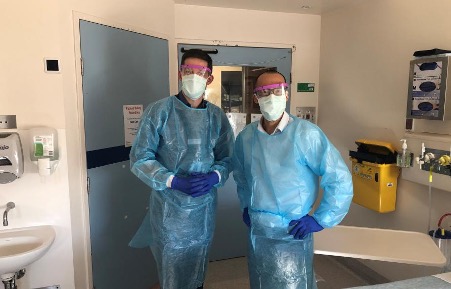09 Jun 2020
Meet the scientist – Q&A with Associate Professor Steven Tong
Meet the scientist – Q&A with Associate Professor Steven Tong, a Royal Melbourne Hospital infectious diseases clinician and co-lead of clinical research at the Doherty Institute
Q: What do you do as a clinician researcher?
As a clinician researcher, I am involved in teams that directly look after patients with infectious diseases, such as COVID-19, and I also conduct research through clinical trials to improve treatments for patients with infectious diseases. For instance, I’m currently involved in a clinical trial investigating treatment effectiveness for patients with COVID-19 and another for patients with golden staph bloodstream infections.
Q: You’re closely involved with the COVID-19 response. What projects are you working on and how do they fit in with the overall pandemic?
I am leading the AustralaSian COVID-19 Trial (ASCOT), which is a clinical trial for patients hospitalised with COVID-19. As a ‘new disease’, there are currently no treatments with established effectiveness for COVID-19. However, there are multiple treatment options and combinations that may be effective. The aim of ASCOT is to generate clinical evidence about treatment options for COVID-19 that can be applied during the pandemic to reduce mortality or the need for mechanical ventilation in hospital in patients who are not yet critically ill with COVID-19
Q: What do you see as the biggest challenge of the COVID-19 response?
While there are many challenges, two come to my mind in particular. The first is the rapid development and testing of a vaccine. The second, which is in my specific area of expertise, is finding an effective treatment for patients within the safe and ethical framework of clinical trials where we can learn by doing.
The traditional approach to discover how a new treatment works when tested in humans is to cycle through several, often lengthy, phases of clinical trials. The study must assess safety of the proposed treatment (Phase 1) and then demonstrate that the new treatment is likely to be effective using a small number of people (Phase 2). Finally, it must confirm that the treatment is effective in a much larger number of people (Phase 3). This process may take many years. Even then, it may fail to show that the new treatment is effective. Given the rapid spread and increase in detected COVID-19 case numbers across the globe, the challenge is to design trials so that we can identify effective treatments and start providing them to patients as quickly as possible in the face of uncertainty. I co-authored an article on the challenge of clinical trials that ‘learn as they go’ for anyone who’d like to know more.
Q: Outside of COVID-19, what are your research interests?
I’m a Principal Investigator in the SNAP trial, which is a clinical trial for golden staph bloodstream infections. It aims to improve treatment outcomes for patients with these common, but deadly infections. I’m also interested in understanding the epidemiology and improving treatments for patients with skin infections due to Group A Streptococcus (Strep A), hospital infections, Indigenous health, viral hepatitis and respiratory infections, such as influenza.
Q: What originally attracted you to the field of infectious diseases?
I was originally attracted to the field through the contribution of wonderful people and mentors in the area and the intellectual challenge that infectious diseases pose. They do not discriminate, affecting all body systems when there is an interaction between the human host and the infecting pathogen. Another primary driver for me was a desire to support people on the margins of society, including migrants, refugees and LGBTQI communities.
Q: When you’re not at work, what’s your favourite #stayathome activity?
Running and walks with my family.
Q: If the pandemic was made into a film, who would play you in the movie?
Matt Damon

Image: Associate Professors Justin Denholm and Steven Tong as the ASCOT trial begins


